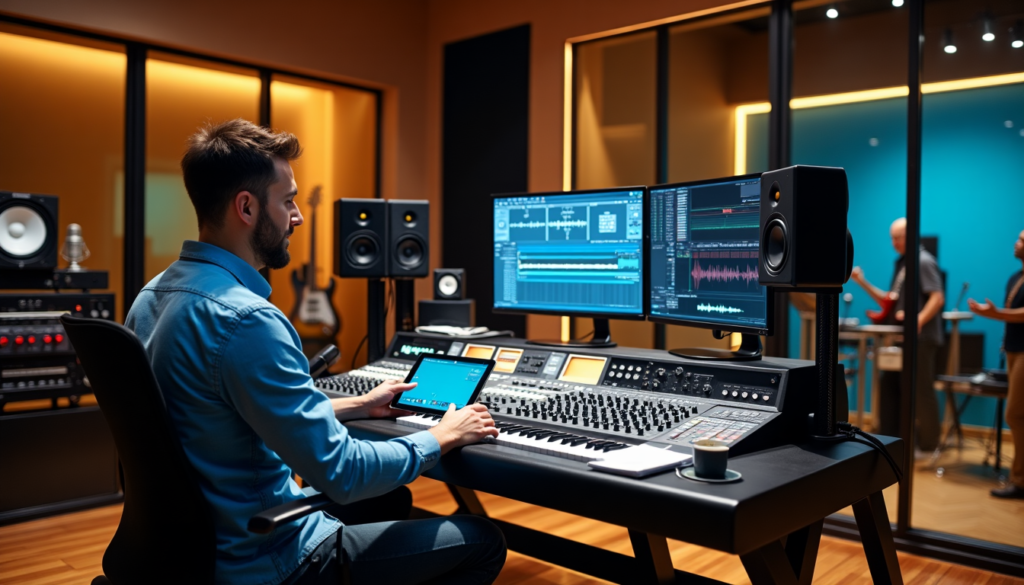Sound engineering careers have changed dramatically over the last two decades. Entry-level professionals now earn up to Rs. 3.5 lakhs annually, and this can scale to Rs. 6 lakhs with experience. The field is growing at an amazing pace, especially in major Indian cities like Mumbai, Bengaluru, and Delhi, among global hubs such as Los Angeles and London.
The industry has evolved beyond traditional studio work, which makes it even more exciting. The gaming industry’s exponential growth and post-production audio’s rising demands have created diverse opportunities. You can design immersive gaming soundscapes or manage live event audio. The field offers many paths to specialize in. In this piece, we’ll explore what industry experts often miss about sound engineering careers in 2025 and how you can set yourself up for success.
The Hidden Side of Sound Engineering Careers
“If you want to make a million in audio, you know how you do it? Start with two million.” — Mick Whelan, Long-time audio professional now with TW AUDiO
Sound engineering careers have a demanding reality behind the glamorous facade of mixing tracks and managing live events. The work schedule goes way beyond regular nine-to-five hours and includes nights, weekends, and holidays. Most professionals put in exhausting 10-14 hour days to manage complex audio equipment and meet tight production deadlines.
The job’s physical demands are intense. Sound engineers must move and set up heavy equipment, which takes both strength and stamina. The role needs complete concentration during long periods of listening and fine-tuning to get the perfect mix.
Mental challenges match the physical ones. Sound engineers need laser focus during long sessions, particularly in festival seasons when work runs from early morning soundchecks to late-night shows. The pressure to deliver perfect audio under close scrutiny creates a high-stress environment.
Technology keeps changing, and sound engineers need to learn and adapt constantly. They must keep up with new audio technologies, production techniques, and networking infrastructure. This need to keep learning adds another challenge to an already tough career.
Finding work-life balance is tough. Project-based work and irregular schedules can affect personal relationships and daily routines. Sound engineers often handle multiple projects at once, which leads to intense work periods followed by uncertain times.
Physical challenges go beyond just being tired. Long periods of focused listening can cause hearing fatigue, which affects work quality and long-term hearing health. The constant need to meet client expectations while maintaining technical precision can lead to stress and burnout.
Yet many professionals love what they do. Knowing how to create immersive audio experiences and contribute to memorable performances fuels their passion. Success comes to those who take on these challenges while building strong technical skills, adaptability, and resilience.
Beyond Traditional Studio Work
Sound engineering careers have found exciting new frontiers in virtual production for 2025. The market size for virtual production techniques reached INR 215.17 billion in 2023 and experts project it to hit INR 710.48 billion by 2030. This growth creates unprecedented opportunities for sound engineers who adapt to emerging technologies.
Modern sound engineering thrives on remote collaboration as its life-blood. Sound engineers now work with global teams through platforms like Dropbox Replay and Avid Cloud Collaboration. These tools provide immediate feedback and version control, making physical distance irrelevant to the creative process.
The gaming industry stands out as one of the most promising career paths. Gaming sound engineers create dynamic soundscapes that adapt to user actions and narrative progression. This role requires becoming skilled at specialized tools like Unreal Engine and Unity, plus understanding adaptive audio design principles that respond to player interactions.
VR and AR have brought new dimensions to sound design. Engineers craft audio experiences that adapt with user movement and environmental interactions. This move requires expertise in spatial audio and immersive sound technologies like Dolby Atmos and Auro 3D.
OSVP has transformed film and television sound engineering. Sound engineers must combine live audio with virtual environments as LED panels serve as dynamic backdrops. The technology gained widespread adoption after its successful implementation in productions like “The Mandalorian”.
Freelancing has become a viable career option with platforms offering various opportunities. Sound engineers tackle remote projects from app development to system tuning. The field requires constant learning since new technologies and formats emerge regularly.
Environmental awareness shapes the industry significantly. Environmentally conscious clients prefer sound engineers who focus on eco-friendly practices and green initiatives. This trend matches the industry’s broader move toward environmentally responsible production methods.
Future-Proof Your Sound Engineering Career
“As a practitioner of this craft you have to simultaneously understand your equipment and your input—meaning the artist on stage or whatever the content is—as well as who is listening to the results of your work.” — David Scheirman, Mix engineer/system consultant
Sound engineering professionals must master AI tools to remain competitive in 2025. AI now handles complex tasks like mixing, mastering, and composing, which lets engineers concentrate on their creative work. Notwithstanding that, AI works as a complementary tool rather than a replacement since it lacks human creativity.
Career sustainability depends on constant learning. The Audio Engineering Society (AES) section activities provide networking opportunities through tutorials, workshops, and master classes for specialists of all types. Sound engineers need to research new audio developments and keep up with changing consumer priorities consistently.
Dolby Atmos, an immersive audio technology, has become the industry standard. Engineers who master this technology have a clear advantage because it applies to cinemas, home theaters, and mobile devices. Knowledge of spatial audio and new formats helps create realistic listening experiences.
This evolving field demands excellent communication. Sound engineers work together with performing artists, producers, and directors. Strong communication channels make task management easier and encourage a productive work environment.
Career longevity depends on flexibility and organizational skills. Successful engineers meticulously prepare for live shows, meet strict deadlines, and adapt quickly to unexpected changes. Engineers who focus on green initiatives and environmentally responsible practices often attract eco-conscious clients .
Traditional workflows have changed because of AI-powered tools like iZotope’s Neutron and Ozone. These innovations balance levels and improve sound quality, but they cannot match human artistic decisions Engineers should utilize AI capabilities while maintaining their creative intuition for the best results.
Team leadership skills have become more valuable. Sound engineers must delegate work effectively and maintain professionalism with their colleagues. Projects grow more complex and interconnected, making this all-encompassing approach vital.
Conclusion
Sound engineering careers have changed substantially, creating a variety of opportunities that need exceptional dedication. The path comes with challenges like long hours and constant technological changes. Yet passionate professionals find the rewards worth their effort.
You need a balanced approach to succeed in this field. Technical expertise matters. Communication skills, leadership qualities, and adaptability are equally crucial. Sound engineers who welcome AI tools while keeping their creative edge become industry standouts.
The field looks promising as virtual production and gaming sectors grow faster. This growth brings new responsibilities with it. Sound engineers must keep up with emerging technologies. They need to become skilled at immersive audio formats and implement green practices.
Note that sound engineering goes beyond technical skills – it creates experiences that move people. The core mission stays constant whether you work in traditional studios, virtual environments, or live events: delivering exceptional audio that connects with audiences.


